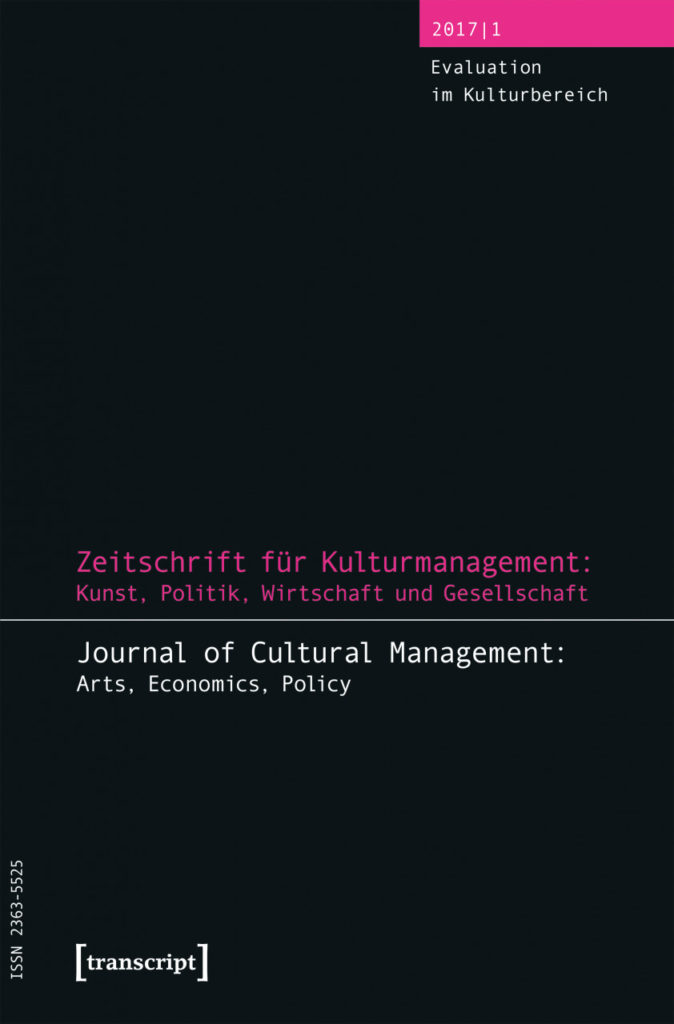Essay
De numeris non est disputandum!
Die Zahl als Rechtfertigungsargument in der bildenden Kunst der Gegenwart
Abstract
The field of contemporary arts is currently going through a serious legitimation crisis. Possible solutions to overcoming this crisis are currently being discussed in the context of debates about the value art can or should have in our society. The proposed solutions encompass a wide range of approaches – from academic ones to appproaches based on the creative economy or social integration – but they all have one thing in common: the use of numerical evaluations as legitimization tools.
In the absence of commonly accepted criteria for the reception and evaluation of contemporary arts, numerical evaluations are not only becoming a substitute for qualitative criteria, they also offer a new foundation for seemingly straightforward but in fact multifaceted legitimatization strategies.
Tempting as it sounds, it would be a mistake to assume that a move back to traditional aesthetics in assessing the value of contemporary arts might still be possible as an answer to this legitimation debate.
A multidimensional axiology that includes numerical and performance-based evaluations alongside usual modes of aesthetic reception might be a necessary step toward a post-aesthetic – that is, a not merely self-referential, autonomous and arts-based – perspective on the role arts have to play in modern society.
Keywords
2017 (1)
Evaluation im Kulturbereich

Related Articles
Lernen braucht Mut
Evaluation in der kulturellen BildungJournal of Cultural Management 2017 (1)
Essay
Zwischen Management und Governance
Braucht Kulturmanagement eine Reflexionstheorie?Yearbook for Culture Management 2011
Research Article
Yearbook for Culture Management 2013
Conference Review
Yearbook for Culture Management 2012
Research Article
The role of culture in development
From tangible and monetary measures towards social onesJournal of Cultural Management 2017 (2)
Research Article
Journal of Cultural Management 2018 (2)
Research Article
© 2026, Journal of Cultural Management and Cultural Policy
Keywords
- Aesthetics
- Higher Education
- Cultural Diplomacy and Foreign Cultural Policy
- Occupation
- Career and Professional Role
- Audience Development
- Audience Studies and Visitor Studies
- Visitor Motivations
- Business
- Covid Pandemic
- Democracy
- Digitalization
- Diversity
- Third Sector
- Empirical Aesthetics
- Development
- Ethics
- Evaluation
- Field Theory
- Festival
- Film
- Federalism
- Community Arts
- Societal Change
- Ideology
- Staging
- Career
- Communication
- Concert
- Creative Industries
- Creativity
- Crisis
- Culture
- arts organizations, cultural organizations
- Cultural Participation
- Cultural Change
- Fincancing The Arts
- Cultural Promotion Law
- Cultural History
- Cultural Management
- Cultural Economy
- Cultural Organizations
- Art Education
- Cultural Policy
- Cultural Production
- Cultural Sociology
- Art Education
- Cultural Understanding
- Arts Administration
- Cultural Industry
- Cultural Sciences
- Art
- Art Field
- Arts Research
- Artists
- Artistic Research
- Artistic Reputation
- Arts Management
- Arts Organizations
- Art education
- Arts Marketing
- Arts Administration
- Curating
- Leadership
- Literature
- Advocacy
- Management
- Marketing
- Market
- Media
- Methods Development
- Mexico
- Monumentalizing
- Museum
- Music
- Non-Visitor Studies
- Opera
- Orchestra
- Organization
- Political Expression
- Post-truth Politics
- Professional Role
- Audience
- Audience Development
- Law
- Government
- Role
- Socially Engaged Art
- Social Cohesion
- Social Change
- Social Cohesion
- Non-visitor Socio-demographics
- Socioculture
- State
- Symbolic capital
- Dance
- Participatory Justice
- Theatre
- Theatre Governance
- Theory Development
- Tourism
- Transformation
- Survey
- Entrepreneurship
- Urbanism
- Civil Society


